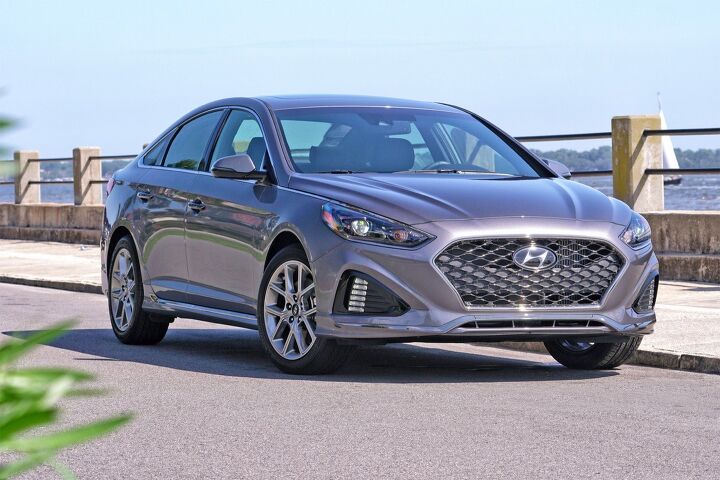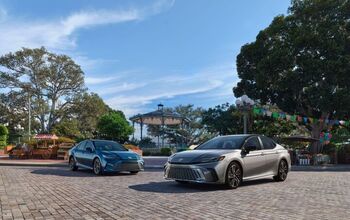Hope for Hyundai? China Agrees to Ignore South Korea's Missiles

When it comes to the positively frosty relationship between China and South Korea, this is the part of the movie where the two countries bump into each other at the bookstore and realize they should work out their troubles instead of giving each other the silent treatment. You know, for the kids.
For South Korea, China’s decision to warm up the relationship — which soured after the jittery country placed U.S.-supplied defensive missiles on its soil — is the best news its auto manufacturing sector has heard in ages. Perhaps soon it won’t be frowned upon to own a Hyundai or Kia in Beijing.
As Reuters reported yesterday, both countries have agreed to patch things up and move past last year’s decision to install THAAD anti-missile batteries in South Korea. The mobile missile launchers are designed as an extra level of protection against possible aggression from the nuclear-armed North Korea.
China, however, found the missiles to be particularly provocative. Not because China remains a tepid ally of North Korea’s authoritarian regime, but because it felt THAAD’s powerful radars could peek into its airspace. In response, South Korea’s tourism industry, as well as its manufacturing and entertainment industries, took a heavy hit in China.
Owning or buying a Korean car quickly became something to avoid. With a market as large as China’s, that spelled extra turmoil during a troubled time at Hyundai Motor Company. The company’s U.S. sales have tapered off, leaving the automaker scrambling to build new crossovers in an attempt to rekindle the fire.
According to The Korea Herald, Chinese Hyundai sales have fallen 37.2 percent over the first nine months of 2017. Kia sales fell 40.0 percent. That’s a big chunk taken out of the automaker’s global volume.
“We see a chance to recover sales on a gradual basis if the official ‘normalization of ties’ leads to easing of anti-South Korean sentiment,” a Hyundai official told the publication. “In the case of the automobile market, the Chinese government actually did not block consumption of South Korean cars, unlike in the tourism industry.”
For Ssangyong Motor Company, the move could mean its shelved joint Chinese plant plans might get a rethink. You’ll recall Ssangyong began looking at entering the American market after groundwork for a China plant went nowhere. (After last week’s board of directors vote, there’s no still word on whether we’ll see a new brand sold on this side of the Pacific.)
“We will have to wait and see how our partner will react to the thawing relations between Seoul and Beijing,” a Ssangyong official told The Korea Herald.
[Image: Hyundai]

More by Steph Willems
Latest Car Reviews
Read moreLatest Product Reviews
Read moreRecent Comments
- Zipper69 "At least Lincoln finally learned to do a better job of not appearing to have raided the Ford parts bin"But they differentiate by being bland and unadventurous and lacking a clear brand image.
- Zipper69 "The worry is that vehicles could collect and share Americans' data with the Chinese government"Presumably, via your cellphone connection? Does the average Joe in the gig economy really have "data" that will change the balance of power?
- Zipper69 Honda seem to have a comprehensive range of sedans that sell well.
- Oberkanone How long do I have to stay in this job before I get a golden parachute?I'd lower the price of the V-Series models. Improve the quality of interiors across the entire line. I'd add a sedan larger then CT5. I'd require a financial review of Celestiq. If it's not a profit center it's gone. Styling updates in the vision of the XLR to existing models. 2+2 sports coupe woutd be added. Performance in the class of AMG GT and Porsche 911 at a price just under $100k. EV models would NOT be subsidized by ICE revenue.
- NJRide Let Cadillac be Cadillac, but in the context of 2024. As a new XT5 owner (the Emerald Green got me to buy an old design) I would have happy preferred a Lyriq hybrid. Some who really like the Lyriq's package but don't want an EV will buy another model. Most will go elsewhere. I love the V6 and good but easy to use infotainment. But I know my next car will probably be more electrified w more tech.I don't think anyone is confusing my car for a Blazer but i agree the XT6 is too derivative. Frankly the Enclave looks more prestigious. The Escalade still has got it, though I would love to see the ESV make a comeback. I still think GM missed the boat by not making a Colorado based mini-Blazer and Escalade. I don't get the 2 sedans. I feel a slightly larger and more distinctly Cadillac sedan would sell better. They also need to advertise beyond the Lyriq. I don't feel other luxury players are exactly hitting it out of the park right now so a strengthened Cadillac could regain share.


































Comments
Join the conversation
I understand your concern, but Hyundai does have a good portion of their supply chain and mfg in the US. Elantras are made in AL as well as KR. Not sure about the GT though. https://www.hyundaiusa.com/new-thinking/built-in-usa.aspx
Let’s suppose Kim decided to act on his fantasy of conquering South Korea, and the USAF lost all the keys to the bombers and didn’t vaporize Pyongyang. The Norks would triumphantly enter the Hyundai offices and find.. nothing. The bank accounts would contain nothing, the contents having been wired out of the country days before. Same with all the intellectual property, having been FTPd to Hyundai’s new world headquarters somewhere in the USA where they had just chartered themselves as a US corporation. They’d be just down the road from the LG and Samsung world HQs. Realtors would be working feverishly to find homes for all the Korean employees that just arrived as refugees. Various US states would be in a bidding war to entice H/K to locate new assembly plants while the Norks try to figure out how to reverse engineer and build cars in the stripped facilities that they could only sell to China.